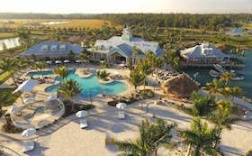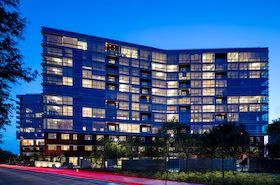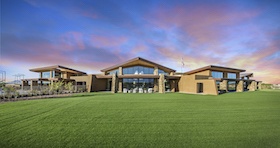Which Towns and Cities Have the Most Active Adult and 55+ Communities?
Category: Active adult communities
April 19, 2020 — We were curious – which towns and cities offer the greatest variety of 55+ and active adult communities? To answer that question, we have prepared this report, which we hope will be useful in helping refine your search for the perfect active community. The numbers used here come from the Topretirements.com database of 4,123 active adult, 55+, and independent living communities. What is most amazing about this report is the astonishing variety of community types available – anyone who thinks that retirement living options are all the same is sadly mistaken. It also says a lot about where people and the real estate market agree about where to retire.
Sunbelt prevails – and a surprising winner.
As might be expected, states and towns in the Sunbelt tend to have the most active communities. Florida is jam-packed with them – in our FL Directory, which has reviews of almost 1,000 active adult or 55+ communities, 270 of those are clustered in just 11 towns and cities. Arizona, California, Nevada, the Carolinas, and Texas have thousands of communities among them. Pennsylvania, New Jersey, and Colorado represent non-Sunbelt states with huge numbers of retirement living choices. The biggest surprise was the city that came in 4th place for the most communities – the City of Brotherly Love, Philadelphia.
Cities and towns with more than 25 communities
There at at least 50 towns in our Directory that have 10 or more communities to choose from; more than 10 have 25 each. Each city name provides a link which goes to our Directory, where you can see all of the choices for each town. Here are the cities and towns with the most communities in that Directory:

Naples, FL. There are 49 communities listed for the Naples area of Florida’s southwest Gulf coast. The range they represent is fantastic – from some of the wealthiest in the world (Mediterra and Grey Oaks and Estuary), to RV and mobile home parks like Marco Naples RV Community, to Continuing Care Retirement and Lifecare communities like Moorings Park. Whatever lifestyle you are looking for, you will find it in Naples!


Fort Myers, FL is tied with Dallas, TX for the second most active adult communities at 39 each. In Fort Myers you can find a wide range of communities that range from very economical RV parks to very high end gated communities with exclusive amenities. Some of them, like Seven Lakes Golf and Tennis Club, were among the first active communities in the country and offer great value at a reasonable cost, although now they tend to have an older population. Tropicana Co-op is another low cost option with a limited set of amenities. Many of the newer ones are fancier and more expensive. Shell Point and Cypress Cove are two CCRCs that tend to cater to better off clientele. You could spend weeks in the Fort Myers area checking out the various possibilities.

Dallas, TX, also with 39 communities, offers the best range of communities to choose from in the West. Choices range from high rise luxury Life Care communities like Ventana by Buckner to huge developments like Robson Ranch further out from town. In between there are independent living choices, budget options, and high end properties. You can even park your plane at an airpark community like The Landings Airpark.
Las Vegas, NV has, not surprisingly, a huge number of retirement living choices (37). You can find golf-centered communities like Red Rock Country Club, or apartment living at the Country Club at the Meadows. An interesting hybrid is something like Fairway Hills at the Ridges, a 55+ community of condominiums within a larger all-ages community by Toll Brothers. No matter what lifestyle of type of home or community you are looking for retirement, you can find it in the Las Vegas area.

The Philadelphia area has an amazing number of active communities to choose from. These range from luxurious high rise apartments downtown like 10 Rittenhouse Square to sprawling developments in the suburbs and surrounding area such as Traditions of America at West Brandywine, and everything in between.
Arizona had the 5th and 7th place winners for the most retirement communities with Tucson (32) and Mesa (28). Options in Tucson range from the simple and economical Desert Pueblo Mobile Home Park to luxury living at the base of the Catalina Mountains in Ventana Canyon. Splendido at Rancho Vistoso is a CCRC with the full range of options from independent nursing to skilled nursing and memory care. The Mercado District is a traditional neighborhood master planned community just west of downtown that offers a unique and more walkable lifestyle.

Mesa offers similar options close to Phoenix. The Cliffs offers affordable manufactured homes, while Encore at Eastmark opened in 2015 with a Village Center.

Sarasota, FL ended up in 6th place for the highest number of retirement choices (29). As with the other towns with a huge selection of communities, they are of all types available; from waterfront luxury, to high rise apartments, single family homes, manufactured homes, independent living, condos, and rental apartments. Places like the Cascades of Sarasota offer huge grounds with amazing amenities such as 6 har-tru tennis courts. Elsewhere in Florida, Boynton Beach on the Atlantic has 28 communities of all types. This more affordable area has options ranging from those near the beach or the Intracoastal to sprawling communities west of I 95 like Valencia Cove.
Other towns with 25 or more communities to choose from included San Diego, Ocala, Asheville, and Myrtle Beach. All offer an amazing array of choices for every possible kind of lifestyle. It’s a great time to check them out online, since visiting them right now is out of the question.
For further reading:
America’s Most Expensive Communities
50 State Directories and foreign countries too!
Comments? What kind of community are you looking for? Have you found some choices in the area(s) you prefer, or did you have to look elsewhere? Let us know your ideas in the Comments section below.






Comments on "Which Towns and Cities Have the Most Active Adult and 55+ Communities?"
Admin says:
Question from J: I am looking for a place in florida or s.c. on water such as a canal, lake, etc. in a community that offers assistance when needed. I am 82 and want a 2 br 2 bath, garage, sun room of mostly glass. a newer home would be great but I need the good support service due to family only in n.j. I lived in ft. Lauderdale for 12 years , owned 4 homes, always on canals or lakes. HOA cannot be outrageously expensive. the amenities are not that important as I stay pretty much to myself but of course, I want to feel safe. any ideas?
Editor:
Thanks for writing. There are so many possibilities in Florida for what you are looking for. It is a very big state! If you are looking for some assistance as you age (you seem to be doing well so far!) you should probably look at an assisted living community, which offer built in help. If you move into a 55+ or active community you would be on your own for finding assistance, having to rely on visiting nurses or independent contractors. With assisted living or in a Continuing Care Retirement Community you can transition from independent living to assisted living to nursing support without ever having to move. They tend to be expensive, but worth it if you can afford it.
You can use our Advanced Search feature to find communities by type, size, price range, etc. If you can narrow your search down by town it would make your quest easier. https://www.topretirements.com/Browse.html
Sorry I can't be of more help, this is a free site and unfortunately we don't have the resources to provide individual advice. I have posted your query anonymously and hope that maybe some of our members can help.
Admin says:
So with COVID going on and everyone more concerned with scoring toilet paper and Zooming with friends, I am curious, is anyone still thinking about where they are going to retire? Or are you too discouraged to even contemplate the subject?
RichPB says:
Ken, good question. Though long retired myself I do wonder how the virus affects plans. Clearly the situation is not good.
In some ways, having already retired is a plus for those that planned and prepared for retirement. We all get hit by fallen(ing) investments, but many were not working, some may have more minimul contact with others, we are used to managing on a budget and our travel can be postponed. On the very negative side, many likely are in a high risk status.
I'm sure there are more sides to this, but would like to hear what those on or near the cusp think and feel.
Mary11 says:
We are retired and currently renting a condo in SAN Diego. We were planning on buying a home but since you can't tour the homes we plan on staying in place for the duration. Kinda feel like we're in limbo not knowing how long we will have to wait...
Larry says:
I wonder how many people who look exclusively at 55+ communities do so because they want to live with people their own age. Certainly, there is nothing wrong with that objective, but it can be accomplished in many communities that do not have in place the restrictions of minimum-age requirements. Consider, for example, the communities that line Highway 17 in North Carolina, just north of Myrtle Beach. These communities are open to residents of all ages but, de facto, are populated almost entirely by mature adults. As one local real estate broker once explained to me, the costs of even a modestly priced community -- especially one with amenities that must be subsidized by a homeowner's association -- are beyond the financial wherewithal of young, growing families. So few of those communities ever see a school bus, and the only squealing of children is in summer, when grandma and grandpa are happy to spend time with their grandkids. Likewise rural planned communities where industry is light and the schools, frankly, are not of the highest quality, attract almost exclusively retirees. My point: You don't have to sign up for the restrictions of a 55+ community just because you want to be sure you are surrounded by folks like you. There are folks like you -- and me, I'm 72 -- in planned developments that are nominally open to all.
Jennifer says:
Larry:
I totally agree with you on this. I hate to see older people isolating themselves within their own age groups. Financial considerations do indeed keep out many families--if you purchase in an area with good school systems then you will see more children. Younger people keep us all current and young. In our co-op, we are on 15 acres and have four buildings. Most people who have children move-in with a new baby or one on the way and then move on to a house as their family grows. Many of us have enjoyed having a few well behaved children around, but we do not have too many. We also do not have a pool or playground so we are not super child friendly, the parents know this when they choose to move here. The benefits of mixed ages as they come and go are good for our community. We have many older people and I have lived here 26 years.
Jean says:
Larry, We never wanted to move to a 55+ community, thought the whole concept of them was somewhat odd. And then we rented a nice house in one (would have rented in any neighborhood, this house was newer, cleared and closer to the area we wanted than the other rentals we looked at). It didn't take long for us to really enjoy living there and when we decided to buy we did seek out a 55+ place. A couple of the people we became friendly with had moved there from a mixed age community and main reason they moved was to get away from adolescents and teens and their careless parents. As for the schools, I'd suggest that poor school systems are more reason to seek out 55+ communities since the school system reflects the concern and involvement (most of) the parents in the area have for the kids.
Alice says:
I think most people instinctively know when its time to hit the easy button and move to a 'senior' community. After spending 10 years in a community such as Larry described, we decided to move to a 55 plus community because we needed a house sized to meet our future needs; activities that don't require driving to; activities which occur on a retired person's schedule (as in daytime, not after work). We also wanted the security of a gated community, lawn care included in our HOA, and the ability to 'lock and leave' for extended travel without too much worry about what is happening to our house. I agree that senior living isn't for everyone, but for us it was a very positive move.
Larry says:
Jean and Alice, my point was only that most of the things you will find in a defined 55+ community you can find in many that have no restrictions on age. Specifically, Alice, off the top of my head, I could probably list a dozen gated communities with every one of the activities and services you identified as important.
Steve says:
Jean & Alice: Agree with you. We moved into a "55" plus community 13 years ago when I turned "55." Our last home was on a street with mixed ages. The children, preteens and teens ran wild. They would ride their bikes across our lawn; drop their bikes wherever they please on our lawn and driveway and leave their soccer balls in the garden beds. The teens would have loud, crowded parties and beer bottles were left all over the place by the following morning. And - the parents absolutely didn't care - "they're just kids." And - this was an "upscale" neighborhood. Now - 13 years later - when I tour the old neighborhood - it doesn't look so "upscale."
Now, we have an active HOA that ensures all the homes and properties are maintained; generally neighbors are respectful of others (not all); no crime; clubhouse and facilities (which will reopen after the virus is under control); and we have a sense of security. For us, for now - it works however, I know it may not be for everyone.
Caps says:
We would like to find a place to rent February 2021 near the beach on the gulf coast in Florida. We don't want to be stuck in beach traffic, or have trouble with parking.....is that possible? While we are there, we plan to look for a turnkey condo or home to buy (Venice area perhaps). I have spent hours researching. There must be a lot of others planning to rent as well, cuz there isn't that much still available, except for the small, or the more expensive places (8k+ per month). I too, thought the virus would curtail the number of travelers. Time will tell, but it doesn't seem like it yet.
Admin says:
Note: We have moved some comments made in response to Larry's to a new Blog post exclusively devoted to that topic - 55+ communities vs. all ages active adult communities. Here is where you can find them:
https://www.topretirements.com/blog/active-adult-communities/which-is-right-for-you-a-55-community-or-an-all-ages-active-adult-community.html/#comment-312748
We would love to hear your comments on that topic there, and keep general comments about where and if you are looking here. Thanks.
Larry says:
Earlier in this thread, Ken posed a question about whether folks are discouraged from pursuing their retirement relocation plans because of COVID. From discussions with real estate agents in the Sunbelt and from anecdotal evidence, my response is a qualified "yes," but there are a good number who are not deterred. I sat in last week as a fly on the wall to one major golf community's Zoom session with 30 prospects. The participants asked a lot of questions, some specific and some not so much {e.g. "What is your community like?"}. My sense is that the yin is that people are scared about their savings and the ongoing threat of the virus, especially to seniors; and the yang is that they realize prices are dropping, as they did post-2018. Those who have conserved their savings and had a plan to move in retirement should be preparing now, with research and communication with real estate professionals, to visit when the all-clear (or, at least, mostly clear) signal becomes trustworthy. I recall that the "bargains" after the recession lasted two to three years. The timeframe may be longer post-COVID, but the best prices will be available earlier, rather than later. For those of us who live in the North and want to move South, the cost-of-living savings (especially property taxes) can reach as much as 40%. As you look at your portfolios and bemoan your loss of buying power, understand that in many cases, when you move from high-cost to low-cost locations, you are giving yourself a big raise. You may be able to afford more than you think.